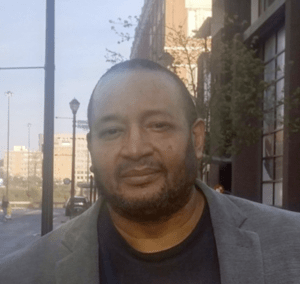
Addressing the impacts of the climate crisis demands big solutions and big initiatives because the climate crisis is driven by big, systemic human behaviors. Grassroots resistance to those systemic forces is critical to stopping the things that are destroying us – those entrenched, destructive behaviors that put profit over people. But it is also critical that we imagine the things we need to start doing. We need to apply scientific and technical and engineering knowledge to the practical challenges presented by the impacts of climate change on the most vulnerable communities. Garry Harris is just the person for the job.
Harris describes himself as a “scientist, engineer, faith leader, educator, activist, and advocate” with a background in the energy industry, and his experience, expertise, and convictions give him a unique perspective on the scope of the transformation needed in our technology and infrastructure in order to ensure a sustainable future. Harris believes that a sustainable future must be one that centers the communities that are the most vulnerable to the effects of climate change. If sustainability means developing systems that ensure a future for future generations, we cannot achieve sustainability without justice.
Harris founded the Center for Sustainable Communities (CSC) in 2015 to apply his knowledge of science, engineering, and technology through an environmental justice and equity lens to help make communities healthier, cleaner, and safer. While many of CSC’s projects are local in scope, they work all over the United States, making CSC one of a handful of Joint Plan of Work partners that operate extensively outside of Virginia. “Give me a topic in sustainability and we either did it, are doing it, or are about to do it,” Harris says.
In 2021 CSC executed nearly 70 community-based solutions to help meet their objectives. Examples of their work include partnering with higher-education institutions and public entities to develop computer-based technologies to assess environmental hazards in vulnerable communities; developing a workforce app to assist with recruitment for sustainable living-wage jobs; developing a community benefits agreement to provide sustainable wage jobs and career pathways; advancing both the rate and total number of COVID vaccinations through an effective grassroots campaign; improving transit and transportation on a regional scale; and planning and implementing several sustainable development and community-building programs for the city of Portsmouth.
While Harris brings an incredible wealth of passion and knowledge to the work of CSC, he does not believe solutions should be top-down. “We need more genuine engagement from the community,” he says. “People haven’t been given opportunities to engage in processes that impact them and their quality of life. We need to learn how to get engaged in a meaningful manner and… exercise those muscles.”
Each new initiative, each completed project, gives Harris new energy. In fact, he is already planning to expand to several additional community-based organizations and facilities to support workforce development and energy, among other initiatives. His goal is to keep CSC growing. “We are poised for growth. We’re expanding day by day, and we are deliberate and intentional about our mission and vision to create a more just, equitable, resilient, and sustainable world for all.”




